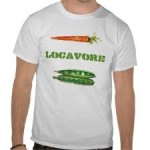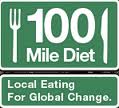A locavore is not a half man, half animal from mythology. Locavores didn’t fight the vampires in a movie. You can’t tell who is and who isn’t, but you might become one if you don’t look out for some “tell-tail” signs.

People who strive to eat food that is harvested within a reasonable distance from their homes are locavores. They eat what is local. They may have different reasons for insisting on certain geography for their meals, but they’ve answered some of the same questions I asked in What Does Farm To Table Mean To Me?
Most locavores hope to avoid processed and industry-created foods. Their goal is to create a greater connection between the farm and themselves. They desire to help their local economy, eat fresher food that tastes better, avoid pesticides or genetically modified foods, and have a belief that local foods are more nutritious.
 “Food miles” is their main concern. Simply, food miles are the distance that food must travel before it reaches your store. The concept is that the global, national and regional transport of food creates possibilities for shipping un-ripe food, coating the items in wax, gassing fruit to appear ripe, and increases the likelihood of spoilage and contamination.
“Food miles” is their main concern. Simply, food miles are the distance that food must travel before it reaches your store. The concept is that the global, national and regional transport of food creates possibilities for shipping un-ripe food, coating the items in wax, gassing fruit to appear ripe, and increases the likelihood of spoilage and contamination.
When food miles are fewer, there’s less impact on our ecology and economy. Food that is first flown on an airplane, and then driven in a truck to reach your store is consuming a lot of fuel in transport. Food flown from Brazil doesn’t help your local farmer. It really doesn’t help the Brazilian farmer either; he sees a fraction of the money. Long range transport of food benefits the processing and transportation companies.
Food author and activist, Michael Pollan explains in this video:
You may have to “pause” and let the video buffer if it stalls.
You might be a locavore if….
1) You Know What’s In Season – You don’t eat a strawberry in winter. When blueberry season is over, you don’t eat blueberries anymore. Fall means apples, Winter means potatoes and root vegetables.
Food miles are fewer when you eat only what appears from the ground at certain times of year, those items that are able to grow locally. You’re a locavore if you’re aware of the seasonality of foods and eat them only when available.
You might be a locavore if…
2) You Shop Mostly At Farmers Markets – You like to shake the hand of the guy that pulled the lettuce from the ground. You enjoy speaking with the people that supply your food more than a supermarket clerk who has no idea.
Local foods at farmers markets are most certainly the freshest. Most often, you’ll be purchasing something that was growing in dirt just hours earlier. This item is at the height of its flavor, and you see it as a precious commodity. Lettuce in a shrink-wrapped Styrofoam tray doesn’t appeal to you at all.
You might be a locavore if…
3) You Avoid Frozen, Convenience, and Canned Foods – You can’t eat local if your food needs to be frozen, preserved, or protected with a metal can. If you find yourself wincing at the salty army-green beans from a can, but smile at the crisp crack of a fresh bean, you know the difference between global and local foods.
The food miles associated with frozen and refrigerated foods is even greater than vegetables! The amount of energy needed to alter the food for processing; the addition of preservatives, then the electricity to keep it frozen will make a locavore shiver.
You might be a locavore if…
4) You’re A Member of a CSA – Community Supported Agriculture (CSA) is a locavore’s home. With a CSA, local farmers pool their resources to offer a weekly delivery of the freshest ingredients from the farm directly to the customer.
This has become very popular in suburban America, but is quickly reaching the larger cities. If you find yourself anxiously expecting your weekly produce box from the CSA because it will dictate what you’ll eat this week, you’re a locavore.
You might be a locavore if…
5) You Support Restaurants That Source Locally – When you DO eat at a restaurant, you look for the ones that share your philosophy. Those establishments that call themselves “farm to table” or “farm to fork” are run by locavores!
These restaurants are supporting the local farmers, but are probably motivated by the fact that local foods just taste better.
Look in the mirror. Do you look different? Is it a full moon tonight?
Are you already a locavore or becoming one?

Trackbacks/Pingbacks